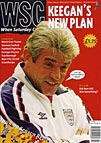 Having been caught on camera leading a chorus of sectarian songs, the former Rangers vice-chairman Donald Findlay had no choice but to resign, Gary Oliver explains
Having been caught on camera leading a chorus of sectarian songs, the former Rangers vice-chairman Donald Findlay had no choice but to resign, Gary Oliver explains
A peculiarity of Scottish law is that a jury may find a charge “not proven”, a verdict widely interpreted as meaning: we think the defendant is guilty, but cannot prove it. One who argues passionately that this controversial option be preserved is leading defence lawyer, and erstwhile vice-chairman of Rangers, Donald Findlay QC – a man against whom the accusation of sectarianism has for some years been, well, not proven.
But in celebrating Rangers’ Scottish Cup victory over Celtic, Findlay was caught bang to rights, captured on film performing a medley of Orange anthems.
For over a century Rangers Football Club have been a totem of the Protestant cause. Desperate to portray a progressive, cosmopolitan image and be regarded as a major player in Europe, David Murray has long condemned the fundamentalists and recruited numerous Catholic players (mostly from outside Scotland, although Neil McCann also arrived last season). Nevertheless, reports would still occasionally surface that behind closed doors certain players and officials continued to celebrate success by singing from the Loyalist songbook.
Findlay’s carousing took place at a private function, but the Daily Record obtained a grainy amateur video of him leading a choir that purported to be, among other things, “Up to our knees in Fenian blood.” Within hours of the stills being published, Findlay had become an ex-director, conceding that he had been guilty of a “serious misjudgment”.
The sectarian singsong outraged the Record, but was Findlay’s choice of party song in any sense news? Born on March 17th, St Patrick’s Day, Findlay has always claimed, not entirely in jest, that his birthday should instead be July 12th – the date in 1690 on which King William of Orange defeated the forces of King James II at the Boyne. And twice in recent years the advocate has represented defendants accused – and convicted – of a murder and a heinous assault, both victims apparently picked on simply for being Celtic fans. Defending the indefensible is obviously, from time to time, part of any barrister’s job. Nevertheless, Donald Findlay’s casebook reinforced his reputation as the Protestant extremist’s friend.
A rendition by Findlay of what he once referred to as “harmless folk songs” might, on another occasion, have been less controversial. But the Cup final came only weeks after the kerfuffle of Rangers’ title win at Celtic Park and solemn editorials had decreed there must be no repeat of the deranged behaviour by fans and players. Nor, it transpired, were the tabloids prepared to tolerate any “serious misjudgment” by a Rangers director, especially one intoxicated by both drink and Cup success.
At a time when so many directors of major clubs are only interested in the value of their shareholdings, it was, in a perverse way, quite refreshing to find one instead made exultant by the events on the park. Donald Findlay began his performance by posing the rhetorical question, “Did these boys not work it right up them?” Had Findlay left it at that, he would still be seated in the boardroom.
“I will continue to be the Rangers supporter I am,” he insisted in his letter of resignation. Yet on Wednesday June 2nd, 48 hours after the Daily Record’s exclusive, the Scottish edition of the Mirror ran a front page editorial calling for him to be permanently banned from Ibrox. However distasteful his karaoke performance, the disproportionate press reaction suggested Findlay might have a point when claiming, “I believe there is a lot more to this.”
Still, few would disagree with his confession that his conduct was “unacceptable”. As a prominent Scottish Conservative, Findlay was a leader of the anti-devolution campaign that urged voters to “Think Twice”. How he must wish he had heeded his own advice before taking the microphone.
From WSC 149 July 1999. What was happening this month